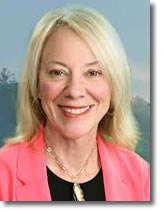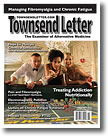|
Nancy Gahles, DC, CCH, RSHom(NA), lives and works in Far Rockaway, a narrow strip of land on the edge of New York City, looking out at the Atlantic Ocean. Many police officers and firefighters, active and retired, live in the area.
Gahles has been in practice for over 24 years, combining herbs, nutrition, yoga, and meditation along with structural correction for a variety of health issues. She first became interested in homeopathy when she found it effective in caring for her son, who'd developed allergic asthma. In addition to her training as a chiropractor, she trained in homeopathy. For several years she served as president of the National Center for Homeopathy, and she is on the board of directors of the Integrative Healthcare Policy Consortium.
On September 11, 2001, the Rockaways lost more people per capita than any other part of the city.
"Firefighters, cops, that's our community," says Gahles. "I practice family medicine here, and I saw the devastation." During the first stage of the process, when first responders were working the initial rescue, recovery, and cleanup efforts, Gahles reached out to battalion chiefs who lived in the neighborhood.
 Aconite is a homeopathic remedy for acute shock, used when there's extreme fright or anxiety. "One of the battalion chiefs was taking tubes of aconite down to the pile as they were digging," Gahles recalls. "Each time they would unearth a finger with a wedding ring on it, the shock would reverberate through them. Then they would use the homeopathic remedy, calm down and get back to work." Aconite is a homeopathic remedy for acute shock, used when there's extreme fright or anxiety. "One of the battalion chiefs was taking tubes of aconite down to the pile as they were digging," Gahles recalls. "Each time they would unearth a finger with a wedding ring on it, the shock would reverberate through them. Then they would use the homeopathic remedy, calm down and get back to work."
But even after the site was cleared, 9/11 had long-term effects. "The loss of life was traumatic, but not only the loss of life," Gahles says. "I started to see pervasive effects: alcoholism, deteriorating family relationships, anger, children with supposed ADHD, anxiety, and depression."
She volunteered to work with these patients using homeopathic methods, but at the time no one was open to the idea. A fund had been set up for psychological services for first responders, but they weren't coming in for treatment. "Firefighters don't go for that. They go back into dangerous situations, they don't cry about them," Gahles says. "I watched this happening. I saw many symptoms of PTSD which weren't diagnosed as PTSD. Women would tell me that their husband has nightmares, he is angry, but he doesn't want to come in for treatment."
However, these patients were also experiencing physical symptoms such as back pain. Gahles began seeing patients for back pain, offering treatments that would be effective for the underlying traumatic situation, as well as the back pain.
In October 2012, the Rockaways were devastated by Hurricane Sandy. "Our whole neighborhood was destroyed. Houses flattened. It was beyond imagination," Gahles says. People were displaced, and for a year she didn't see many of her long-term patients, since they were living with relatives in other parts of the city. Over time, when they started to come back, they spoke frankly about the overwhelming stress in their lives. This stress expressed itself in physical disorders such as adrenal fatigue, thyroid dysfunction, cancer, chronic fatigue. "They have every manner of diagnosis but I know what happened to them; I know their trauma," Gahles says. "What they have is PTSD. Where is that being addressed? Nowhere."
Gahles is developing a collaborative care model for PTSD. She published her first book a couple of years ago; she expects that recognizing and coping with PTSD will be the subject of her next book. "We know that a collaborative integrative model heals best. I have found that homeopathy combined with cognitive behavioral therapy and positive emotion psychology is enormously effective in dealing with PTSD," she says.
Homeopathic remedies are effective in helping people heal from stress, but then many people fall back into the same patterns. "Initially they feel well, but then they don't have the skill set to carry on in new patterns of behavior," she says.
Gahles's sister is a licensed psychologist who specializes in cognitive behavioral therapy (CBT), so they began treating patients as a team. Then they added positive emotion psychology techniques, which are able to undo the effects of stress. "We find this combination to be extremely effective," Gahles says. In addition, she perceives a trend moving in this direction: people are more open to these methods, compared with a few years ago. Nowadays Gahles speaks about this new work during every talk she gives. She's also in discussion with publishers about the reasons to describe these methods for a larger audience.
Common-Sense Self Care
In 2012, Gahles published The Power of $elf Care: A Common Sense Guide to YOUR Wellness Solution. This book covers the benefits of chanting, visualization and aware breathing when coping with many health conditions. Gahles discusses the benefits of homeopathic remedies, and the wide variety of methods that she used to help her daughter when special issues arose related to her learning patterns.
One of her patients, writing a review on Amazon.com, says: "I've known Dr. Nancy Gahles for many years and FINALLY, she has imparted so much of her wisdom in a book that is now available to everyone -- hooray! The dollar sign in the title is a little misleading as this isn't a how-to book on saving money per se, but it does use the analogy of an investment portfolio to invest in yourself and your health now, in order to reap 'dividends' later."
The investment-portfolio analogy is quite useful, as we each think about our choices in terms of investing money and time in our own health. "You can't be spread too thin if you appropriately identified your assets and put them into different classes which are invested equitably," Gahles writes. She encourages readers to invest in both conventional and complementary health care, and to invest in both short-term and long-term aspects of care. For example, a person with diabetes needs to budget long term for health insurance and other medical expenses. The individual also needs to invest short term in high-quality nutrition, time for exercise, perhaps a gym membership, a yoga class, or a support group.
"We have to empower and inspire people to recognize their own ability to care for themselves," Gahles says. "That means to be consciously aware of what we're experiencing. You are not just your diagnosis: you're bigger than that. You have a whole body of experiences that have led to the current issue or diagnosis or stuckness."
Recently Gahles read a study about the Boston Marathon which showed that children and especially teenagers who experienced that event, or watched it repeatedly on television, are now experiencing symptoms of posttraumatic stress disorder. "Who is treating this? Who is thinking about it?" she asks.
"We must raise awareness of the levels of stress, and trauma related to stress, in our society. Most importantly, we need to change the way we think about it. Instead of framing this as 'posttraumatic stress disorder' we need to think about 'posttraumatic stress potential' and 'posttraumatic empowerment.' We are not static; we are dynamic. We have the ability to recognize trauma," she says. "We have the ability to heal our lives."
For many recent articles and news about Gahles's current projects, see her website.
Resources
Book: The Power of $elf Care: A Common Sense Guide to YOUR Wellness Solution
Website: http://askdrnancyg.blogspot.com
Contact Info: 718-634-4577 (office); AskDrNancy@aol.com
Elaine Zablocki has been a freelance health-care journalist for more than 20 years. She was the editor of Alternative Medicine Business News and CHRF News Files. She writes regularly for many health-care publications.
|
![]()
![]()
![]()





 Aconite is a homeopathic remedy for acute shock, used when there's extreme fright or anxiety. "One of the battalion chiefs was taking tubes of aconite down to the pile as they were digging," Gahles recalls. "Each time they would unearth a finger with a wedding ring on it, the shock would reverberate through them. Then they would use the homeopathic remedy, calm down and get back to work."
Aconite is a homeopathic remedy for acute shock, used when there's extreme fright or anxiety. "One of the battalion chiefs was taking tubes of aconite down to the pile as they were digging," Gahles recalls. "Each time they would unearth a finger with a wedding ring on it, the shock would reverberate through them. Then they would use the homeopathic remedy, calm down and get back to work."